
Future-proofing your EU funding strategy for the post-2027 period
Preparing for EU funding for the post-2027 period? Learn what organisations can do now to align with policy shifts, build partnerships and strengthen readiness.
Published on 16 December 2024
Have you ever wondered how EU programmes are being developed and who decides about the overall orientation what can be funded within the individual programmes? We are now already in the second half of implementation within the 2021-2027 EU funding programmes. Discussions have started about the outline of the programmes for the next funding period from 2028 onwards.
The official proposal for the next Multi-Annual Financial Framework (MFF) is currently being expected from mid-2025. Now is the time when funding priorities are being engineered. There are ways to influence the design and contents of the future programmes, and advocacy activities of the main stakeholders have started.
The article illustrates the decision-making process leading up to EU funding programmes and provides insights how stakeholders can influence its contents.
As we look ahead to the next Multiannual Financial Framework (MFF) for the years 2028-2034, discussions about EU funding programmes are intensifying. The programmes will be concentrating on the European Union’s priorities and strategies for the future. Hence, challenges such as addressing climate change, fostering digital transformation, competitiveness and safeguarding an inclusive society are among the priorities.
However, the exact funding contents and how the shares of the big funding pot will be distributed to individual programmes is a matter of intense negotiations and lobbying by the different stakeholders such as EU Member States, industry, research actors, civil society organisations and many more. Each of the stakeholder groups have their own specific angle and time-specific intervention options. So, how are these funding programmes decided, and when and how can stakeholders effectively influence their content?
The MFF sets the financial priorities for seven years, providing predictability and stability for both EU institutions and Member States. The next budget will be a means to address the EU’s Strategic Agenda 2024-2029, in line with current major challenges such as the green and digital transitions, creating an innovation- and business-friendly environment, promoting social fairness as well as investments in skills, training and education.
Other factors of influence include:
In view of the strategic priorities and other influence factors as described above, the draft MFF, and later the proposals for EU funding programmes, are prepared, with the European Commission in the lead. The Commission conducts consultations, assessments and impact analyses to determine financial allocations and programme structures.
In the European Council, the EU Member States debate the budget proposal, while seeking compromises between national and EU-wide priorities.
The European Parliament has co-decision power, enabling it to amend and approve the final framework.
During the negotiation phase, the European Council, Parliament and Commission engage in Trilogues for the Multiannual Financial Framework (MFF) proposal. They aim to resolve differences and agree on a final budget framework, including funding priorities and mechanisms. The trilogues are then followed by a formal adoption by both the Council and Parliament.
As the MFF is usually adopted very late in the process due to lengthy negotiations, the EU funding programmes are already being prepared and negotiated in parallel. Once the MFF is adopted, specific funding programmes, such as (in the current funding period) the research and innovation programme Horizon Europe, the environment and climate action programme LIFE, and the Citizens, Equality, Rights and Values Programme (CERV), are being formally established. These programmes then include the financial commitments for the implementation of related policies through grants and other funding tools.
Several factors influence the content and structure of EU funding programmes:
Consultations with stakeholders such as citizens, industry, NGOs and public authorities play a significant role in defining programme goals. The publication of formal consultations for the next EU funding programmes can be expected in 2026. However, the Commission also engages in permanently ongoing stakeholder involvement and consults with e.g. NGOs, private sector representatives, academia and think tanks to explore sector-specific needs and gather various perspectives.
Moreover, the Commission gathers input from the European Parliament, the Council of the EU, the Committee of the Regions and the European Economic and Social Committee. They are in constant interaction with EU Member States representatives as well, for example through Programme Committees of established programmes.
EU Programme Committees exist for some of the EU programmes (e.g. Horizon Europe, LIFE). They are composed of representatives from Member States’ administrations and experts working in the concerned policy area. They are supporting the European Commission in the implementation of the programme. They can as well support the Commission in view of the preparation of the succeeding thematic funding programme – or another dedicated structure can be established. For example, during the Horizon Europe preparations a so-called “shadow committee”, holding the status of a Commission expert group, was set up (Horizon Europe Shadow Committee – including thematic sub-groups).
Programme Committees (or designated thematic expert groups) provide a platform for technical discussions and aim to ensure that new funding initiatives are aligned with EU strategies and actual and factual needs, including national realities and circumstances. Such advisory bodies take lessons learned from previous and current programmes in consideration, identify gaps and propose solutions to enhance efficiency and impact of the future programmes.
Stakeholders have several options to try to influence the shape of EU funding programmes. During this process, the right timing is a decisive factor for being heard and receiving attention. Stakeholders should preferably engage well before the finalisation of the MFF proposal. This includes monitoring policy developments, official statements of the Commission, press coverages, and reacting to these. At the time of writing of this article, various stakeholders have already proactively shared their positions and recommendations regarding the upcoming MFF.
There are different target audiences for conveying your messages:
European Commission
Stakeholders can contribute to the public consultations conducted by the European Commission, and participate in stakeholder dialogues and workshops organised by the Commission. These consultations allow stakeholders to advocate for specific priorities or funding needs and to highlight challenges faced by particular sectors or regions. Such statements presented should be accompanied by data and case studies to support the positions conveyed.
Also, stakeholders can approach the Commission directly, for example by sending a position paper and asking for a bilateral meeting.
Building Alliances with like-minded stakeholders
Forming coalitions amplifies influence. Coalitions within your thematic sector, but also cross-sectoral alliances, such as between industry, NGOs and research organisations, can present unified positions to policymakers. Joined forces often carry more weight than individual advocacy efforts.
Engaging with the European Parliament
The European Parliament plays a crucial role in the adoption of the MFF and funding programmes. MEPs are approachable and often work within specific areas, for example in thematic European Parliament committees, such as ITRE (Industry, Research and Energy) or ENVI (Environment, Public Health and Food Safety).
Advocating at the national level
National governments are negotiating the MFF and funding programmes in the Council. Stakeholders can approach (the offices of) representatives from the responsible ministries who participate in Council meetings (higher political level), to ensure that national positions reflect stakeholders’ priorities. One way is by submitting position papers and/or proposing meetings. Moreover, stakeholders can approach Programme Committee members (technical level) and provide evidence-based inputs, to try to influence the direction of upcoming funding priorities.
Often, national ministries organise structured stakeholder consultations as well, either through surveys or workshops with stakeholders. Some ministries have established advisory groups with representatives from relevant sector organisations.
EU funding programmes provide financing for the implementation of the EU’s policy priorities. While the developmental procedures towards the eventually adopted programmes is complex, the processes are also rather open and of participatory nature. Stakeholders who engage early, build alliances and advocate strategically have a viable chance to influence some of the outcome. As the 2028–2034 MFF preparations have started within the Commission, now is the time for stakeholders to start engaging to ensure their voices are heard and reflected in the EU’s funding programmes.
While it is important to get involved in the advocacy process at an early stage, it is nevertheless important to stay in the game until the very end (= the final adoption of the programmes) to react to priority reshufflings happening along the way and ensure your group’s needs stay continually recognised.
Are you preparing an EU funding proposal and are looking for support? Get in touch via this link.
Would you like to be informed when any new blog articles have been published? Sign up for the EU Funding News & Tips.

Author: Astrid Mechel
https://eufundingconsulting.eu
Hello, I am Astrid Mechel and I work (for the most part) with small and medium sized organisations who aim to access EU funding. It is my goal to help discovering suitable EU project funding possibilities and to provide support to submit a high-quality grant application. My main thematic focus is on grants for research and innovation, environmental sustainability as well as on social inclusion and participation.
Read more articles here:

Preparing for EU funding for the post-2027 period? Learn what organisations can do now to align with policy shifts, build partnerships and strengthen readiness.

EU project funding for nonprofits: Discover 6 misconceptions that hold organisations back and how to turn them into opportunities for growth and impact.

Applying for EU funding can be a complex and challenging. This article offers 12 practical tips to help you avoid the most common stumbling blocks.
Online Workshop
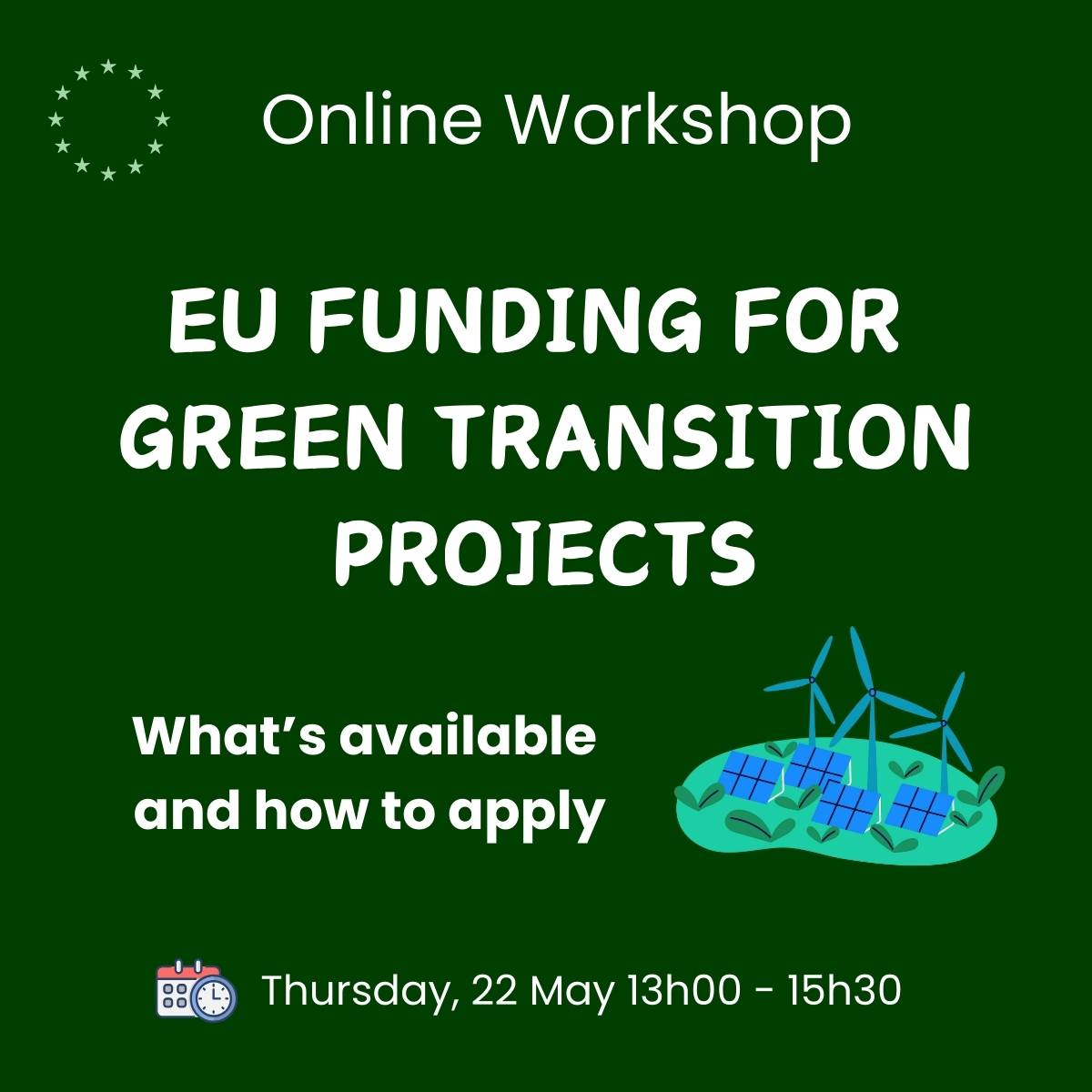
Interactive Live Workshop
On 22 May 2025 from 13h00-15h30
Registrations are closing soon
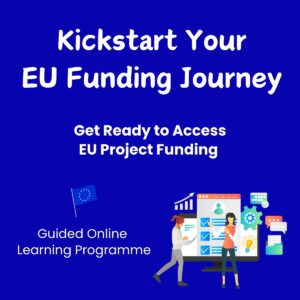
Curious about EU funding and how it could support your next project? Join the new live programme round for a compact and easy-to-follow way to get started with EU funding.
Key Terminologies – Application Guidance

This guidance compares and compare and clarifies the 10 key terminologies within an EU funding application. How should you address them in your proposal, and what kind of information belongs to which one of them?
Online Workshop on 6 November!
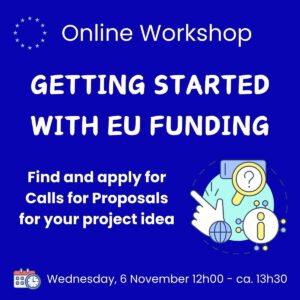
The workshop “Getting Started with EU Funding” is for participants with no or very limited experience in EU funding. Discover what kind of projects the EU is funding, the requirements and how you can apply for funding in your thematic field.
EU Funding Checklist

Do you have a new project idea and are wondering if EU funding could be available for your project?
This checklist will guide you through the most important questions to be considered when applying for EU project grants and includes some further suggestions how you could adapt your concept to be more in line with EU expectations regarding fundability.
Get the brand new upgraded guidance booklet (free offer):
Your compact guide on how they work and how your organisation can apply for funding
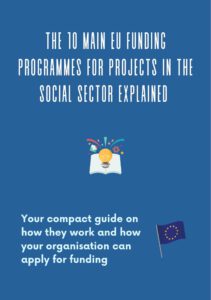
Find out which 10 EU programmes offer grants for projects in the social sector, what the conditions for funding are and how you can apply.
Online Workshop
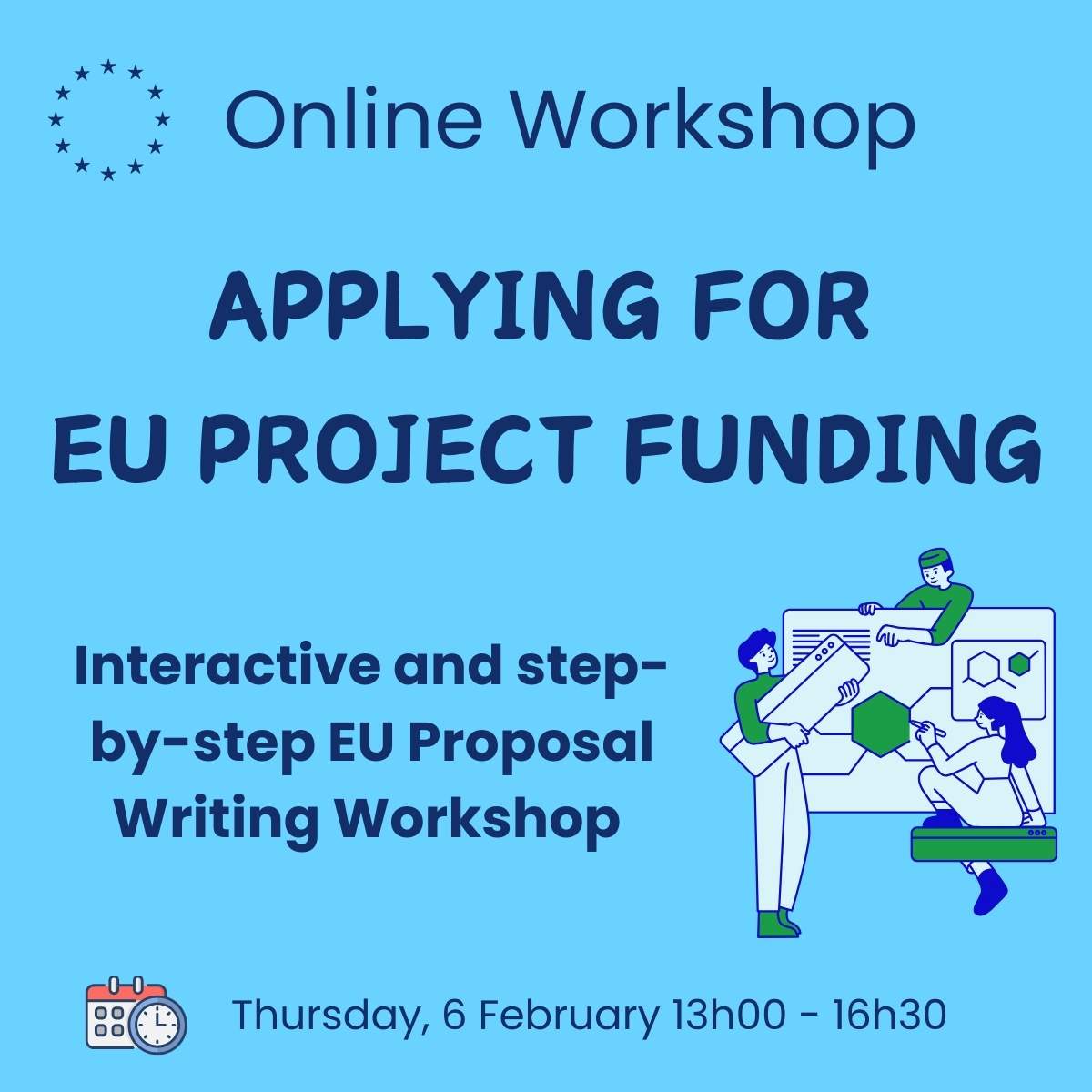
Interactive and step-by-step EU Proposal Writing Workshop
On 6 February 2025 from 13h00-16h30